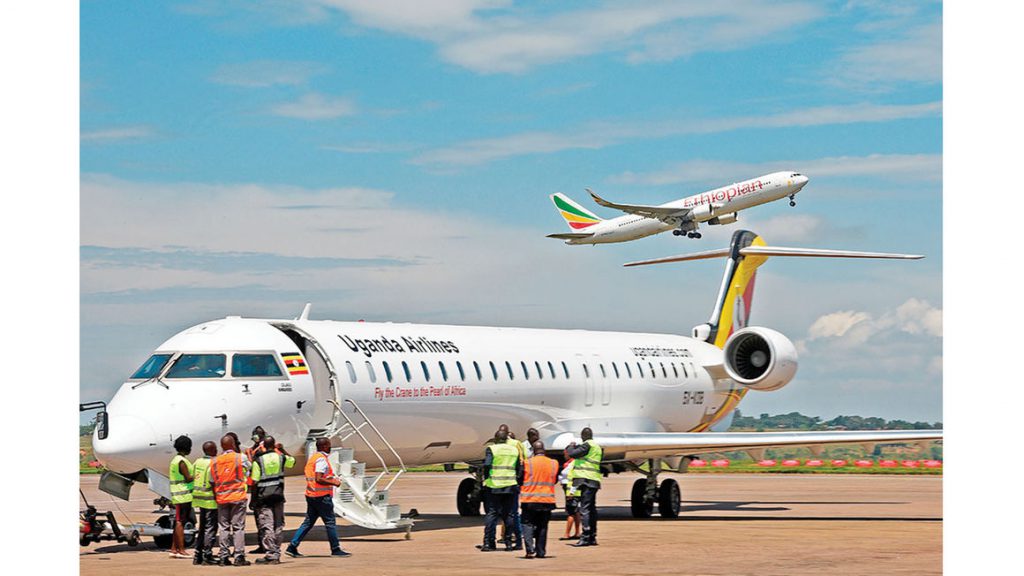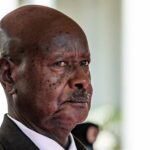
Uganda says Entebbe Airport has not been surrendered to China
Published on December 1, 2021 at 6:55 AM by Chisomo Kambale
The Ugandan Government has denied reports that Entebbe International Airport has not been surrendered to China, or any lender, in exchange for cash.
In a statement, the Information Minister Dr Chris Baryomunsi, who is the government spokesman, said “[the] government of Uganda would like to make it categorically clear that the allegation that Entebbe International Airport has been given away for cash is false”.
“[The] government cannot give away a national asset like an airport. This has not happened and it will not happen,” he noted.
The assurances, which followed a separate rebuttal by China’s embassy in Kampala, follow this newspaper’s lead story last Friday, one of whose two headlines read, Uganda surrenders airport for China cash.
The exposé explored growing unease of Ugandan technocrats over Beijing’s refusal to amend some clauses of the $200m (USh713billion) agreement to build a new terminal and expand runways and new cargo and fuel centres at Entebbe, Uganda’s only international airport.
The project is being bankrolled by China Export-Import (EXIM) Bank and the loan, according to government Spokesman Baryomunsi, “is guaranteed by Uganda’s sovereign credit as a public debt charged on the Consolidated Account in accordance with Article 160 of Uganda’s Constitution”.
“The loan terms provide a grace period of seven years and the period ends in December 2022. The loan repayment is to be made in 20 years at an interest rate of two percent; these terms are favourable and should not cause any concern,” he noted in statement issued Monday’s, adding, “The allegation that the airport has been mortgaged to China’s government is not only malicious, but a pack of lies aimed at causing disaffection among Ugandans.”
The content of the Daily Monitor story has not been impugned, but the government, China and aviation regulator, Uganda Civil Aviation Authority (UCAA), have separately argued that the title was misleading and likely to stir disaffection.
In a statement last Friday, an unnamed spokesperson for China’s embassy in Kampala characterised the controversy generated by some of clauses impugned by Ugandan officials as without “factual basis and ill-intended”.
In a four-page response to a story first published last Thursday, and republished around the world with varying titles, China’s embassy in Kampala noted that the preferential loan extended by EXIM Bank was “guaranteed by Uganda’s sovereign credit, not by anything else.”
The 2015 Entebbe expansion loan agreement, like others before and after it, were inked between the two countries “voluntarily… without any hidden terms or political conditions attached” following dialogue and negotiation on equal footing.
“Terms of the loan agreement for Entebbe [International] Airport expansion [are] in full compliance with the prevailing conventions and practice in the international market. The malicious allegation that Uganda surrenders key assets for China cash has no factual basis and is intended to distort the good relations that China enjoys with developing countries including Uganda,” the official wrote.
Daily Monitor last Thursday detailed how Ugandan officials from the ministries of Works and Finance and Attorney General’s office remain edgy about some unfavourable provisions in the loan agreement that Uganda signed with Exim Bank on March 31, 2015, which if not amended, they argued exposed government assets to attachments and take-over in the event of a default on the loan.
Nothing in the article suggested that Uganda had defaulted, or was on the cusp of defaulting, and the story explored how top Ugandan bureaucrats had become restless over clauses in the Entebbe International Airport loan agreement under which Uganda surrendered its sovereign immunity and immunity of its property.
Part 10.3 of the loan agreement reads in part that: “Each obligor (legal entity undertaking obligation under the agreement) hereby irrevocably waives any immunity on grounds of sovereign or other immunity for itself or any of its property…”
Further, the loan agreement required Uganda Civil Aviation Authority, the aviation regulator, to set up an escrow account to hold all of its revenues.
An escrow is a contractual arrangement in which a third party receives and disburses money or property for the primary transacting parties, with the disbursement dependent on conditions agreed to by the transacting parties, according to Wikipedia.
The agreement provides that UCAA cannot use any of the accrued monies for whatever expenditure without approval from Beijing.
Realising that some of the loan agreement clauses were not being implemented, Exim Bank froze cash flow to the Chinese company undertaking the airport upgrade works.
For instance, the construction firm’s payment certificate No.11 up to 23, amounting to $24.5m (USh88.2billion) for work done from December 2017 to February 2019, were not paid.
Lack of finances affected the contractor and work slowed down almost to a standstill. By the time the Chinese accepted to resume funding, the project had lost 361 days and the country was under lockdown.
“These conditions were not palatable for an international airport of a sovereign state whose operations are dynamic and sometimes unpredictable,” UCAA noted in its latest response to queries by Parliament.
Members of Parliament had questioned the text and spirit of the airport loan agreement, prompting Finance Minister Matia Kasaija to apologise to the House on October 28, 2021.
“In the unlikely event that UCAA were to fail to generate sufficient revenue to service the loan [from Exim Bank), then the central government will step in,” he told journalists after appearing before Parliament’s committee on Commissions, Statutory Enterprises and State Enterprises (Cosase).
Mr Kasaija told the lawmakers that they at the time in 2015 considered the China loan offer as the “best possible alternative and jumped on it”, but admitted that they have since changed their mind about some of the terms of the credit facility, which they have unsuccessfully lobbied Beijing to change.
UCAA in last week’s statement noted that no national assets, whether the airport or others, has not been surrendered, and will not be surrendered, for a loan.
The regulator, however, admitted that an escrow account was opened for depositing its collections in line with the loan agreement, but that it retains spending liberty.
“The arrangement is only similar to what happens when one gets a salary loan or any other loan for that matter, and the bank requests that the salary is channelled through their bank. It does not mean that the lending bank takes over the borrower’s salary.”
The Ugandan government negotiated the loan for the airport upgrading and expansion in 2015 and construction started in 2016. According to UCAA, the loan agreement with Exim Bank provides for a seven-year repayment period, which is yet to lapse, meaning there is no present risk of a default.
In the statement on wide-ranging Uganda-China bilateral and financing agreements, the latter Kampala embassy said Beijing have never “confiscated” any property of Uganda or other African country, and instead negotiates loan repayment rescheduling, and that China is a lead supporter among G20 for easing African countries’ debt burden.
The issue of the pugnacious contractual clauses including among others waiver of sovereign immunity for asset take-over in cases of default and debt swap were first flagged by the Auditor General John Muwanga in a 2019 audit on public debt management.
The audit detailed that as at June 2018, Uganda government had incurred an additional Shs16b in interest to Stanbic Bank, and Standard Chartered Bank on account of debt swap arrangement for repayment of $1.4b (Shs5.1 trillion) loan from China’s EXIM Bank for construction of Karuma dam.
The $1.4b loan has an interest cost of LIBOR, the benchmark interest rate at which major global banks lend to one another in the international inter-bank market, plus a premium of 3.5 percent per annum for a period of 15 years.
The government, according to Mr Muwanga’s report, entered into the swap arrangement to minimise the exposure of the floating interest rate. Under this arrangement the government pays a fixed interest rate of 2.58 percent (0.79 plus a swap premium of 1.79) on its loan, allowing Stanbic and Stanchart to pay the floating interest which is dependent on the LIBOR.
“This means that government will only benefit from this arrangement when LIBOR plus the agreed premium is higher than 2.58 percent,” the audit noted
A review of the interest movements of the LIBOR, according to the audit, showed “a positive movement”, but the government is yet to benefit from the financial arrangement. Since commencement, LIBOR has been lower than 2.58 percent and as a result the government had incurred additional costs.
Policy wonks in the Finance ministry explained that LIBOR is predicted to rise in the future and government will recover the money paid to the two banks as result of the debt swap, which AG Muwanga described as “speculative” because LIBOR has to go above four percent for at least four years for government to realise any benefits. “The government debt management policy on external debt does not give sufficient guidance on the use of instruments such as SWAPs in risk management.
One Finance ministry official charged with debt, speaking anonymously, likened the debt swap arrangement to hedging—an investment position intended to offset potential losses or gains that may be incurred by a companion investment—and said they are considering further experimenting on more commercial loans.
Despite the concerns, China remains Uganda leading bilateral infrastructure financer, with flagship projects including Entebbe airport expansion, Isimba and Karuma dams, National Infrastructure Backbone, and Kampala Entebbe Expressway.
China ranks as Uganda’s top bilateral lender with about 75 percent, followed by France, the United Kingdom which is financing construction of the Kabaale International Airport in Hoima, and Japan which financed the new Source of the Nile cable bridge in Jinja.
These borrowing have significantly increased Uganda’s debt portfolio, above the 50 percent Debt:Gross Domestic Product ratio, which many economists dub as unhealthy while the government insists that both the internal and external debts are within a sustainable range.
According to the International Monetary Fund, Uganda remains at low risk of debt distress, even though debt metrics have deteriorated and one in five Ugandan shillings collected in revenue was in the 2019/20 Financial Year spent on interest payment.
In its statement last week, China’s embassy in Kampala noted that China-Uganda cooperation has always adhered to principles of openness, transparency, mitigation, and debt reduction through friendly negotiations.
“We are fully aware of Uganda’s expectation to benefit more from China-Uganda cooperation. This is also the goal we have always been striving for. We have been willing to listen to constructive suggestions as we continue our efforts to ensure China-Uganda cooperation to be inclusive and benefit more common people.”
China and Uganda established diplomatic relations in 1962, nine days after the latter’s independence, and the former became one of the first countries to open a foreign mission in Uganda.
A 2017 Bank of Uganda study titled, How can Uganda benefit from China’s economic rise? notes that Uganda’s growth trajectory has been strongly supported by increased economic engagement with China, particularly through commodity exports and infrastructure funding.
“China’s model of growth thus generated huge demand for energy and other natural resources (e.g. petroleum, iron, copper, and other metals) and resulted in upward pressure on global commodity prices,” the study reads in part.
“Uganda, similar to most sub-Saharan economies that are primarily commodity exporters, gained significantly from this windfall, which saw the percentage of raw material exports to China jump drastically from 17 percent in 2007 to well over 50 percent by 2015,”
China also reigns as the largest project contractor in Uganda with a long list of projects key, among others, the 51.4km Kampala-Entebbe expressway which cost Shs1.7 trillion, expansion of Entebbe airport costing Shs720b , and Karuma and Isimba hydropower dams, which combined cost Shs6.7 trillion.
Uganda’s statement on the Entebbe airport agreement
[The] government of Uganda would like to make it categorically clear that the allegation that Entebbe International Airport has been given away for cash is false.
[The] government cannot give away a national asset like an airport. This has not happened and it will not happen.
The Entebbe International Airport expansion and upgrade project is a $200m (Shs713b) intervention financed by China EXIM Bank and is guaranteed by Uganda’s sovereign credit as a public debt charged on the Consolidated Account in accordance with Article 160 of Uganda’s Constitution.
The loan terms provide a grace period of seven years and the period ends in December 2022. The loan repayment is to be made in 20 years at an interest rate of two percent; these terms are favourable and should not cause any concern.
The allegation that the airport has been mortgaged to China’s government is not only malicious, but a pack of lies aimed at causing disaffection among Ugandans.


